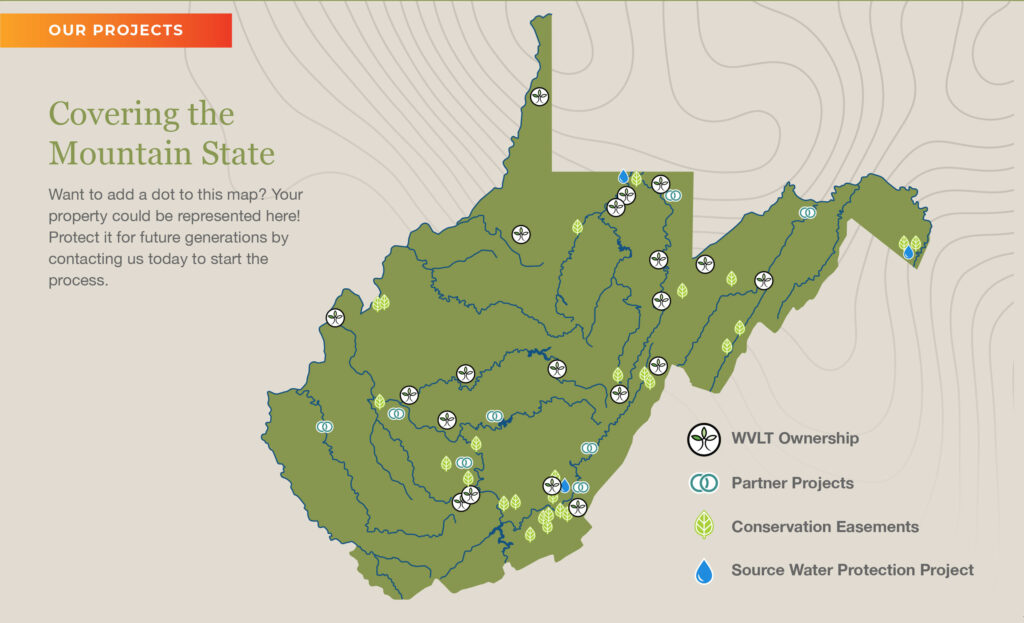DONATE YOUR LAND
Donating a property to WVLT means that we take ownership and the responsibly for protecting your special place. This perpetual commitment is guided by your wishes. Whether you envision your land as a nature preserve, public recreation area, working farm or forest, or some other land use, it is important to clarify up front that your goals align with WVLT’s mission.
Donating land involves transferring a deed of ownership to WVLT either during your lifetime or after death. Donating during your lifetime means that you might qualify for significant tax benefits, while donating after death (through your will) offers a reduced (but still significant) benefit that may accrue to your estate.
SELL YOUR LAND
Selling land to WVLT is also an option for properties that exhibit conservation values aligned with our mission. However, our organizational policies do not allow us to pay more than fair market value, which is determined in an appraisal prepared by a qualified appraiser. WVLT will negotiate the sale price with landowners. A landowner may also consider selling a property to WVLT at a price below fair market value, known as a “bargain sale”. The difference between the fair market value and the bargain sale price may provide the seller with a charitable income tax deduction. A bargain sale also benefits WVLT because it reduces the amount of fundraising needed to complete the deal.
CONSERVATION EASEMENT
A conservation easement is a voluntary contract negotiated between a landowner and WVLT, in which the owner places permanent restrictions on future uses of their property to protect scenic, agricultural, wildlife, forest, or other significant attributes (conservation values). The restrictions usually include limiting subdivision, commercial or industrial development, deforestation, conversion of farmland, and
destruction of streams, wetlands, caves, and other special natural areas. Conservation easements are unique to each property, meaning they address site-specific conservation values and are tailored to meet the individual goals of landowners.
After signing a conservation easement, the document is recorded in a county courthouse and becomes a legal instrument that obligates and gives WVLT the authority to visit the property at least once annually to ensure compliance with the conservation easement terms and to protect the easement in perpetuity. In the future, if a landowner does not adhere to the terms of an easement, WVLT will document these conditions and first communicate “good faith” efforts that can be taken to remedy any issues or misunderstandings. If necessary, WVLT has a right and obligation to take legal actions to remedy an easement violation. WVLT’s commitment to a conservation easement is something that we take on forever!
DONATING OR SELLING A CONSERVATION EASEMENT
Donating a conservation easement to WVLT is typically the preferred and most effective way to ensure the long-term protection of your special place when considering an easement option. The value of a donated conservation easement typically qualifies as a charitable tax deduction on the donor’s federal income tax return. In exceptional circumstances, WVLT may consider purchasing a conservation easement from a landowner if it meets certain conservation requirements. Selling an easement typically does not offer tax benefits unless a landowner is willing to consider a bargain sale (reduced price). Bargain sales are also negotiated to make a project more affordable and practical for WVLT to complete.
Whether donating or selling a conservation easement, a landowner retains ownership and use of the property. They still have a right to sell the property or leave it to their heirs. The negotiated restrictions are in place forever and WVLT is obligated to monitor and enforce the conditions of the easement.
LIFE ESTATE
Establishing a life estate allows you to transfer your property to WVLT now, while continuing to live on it for the rest of your life. This retained life estate arrangement ensures your property is protected for agreed upon purposes and may also provide both you and your estate with significant tax benefits.
Under this scenario, a landowner gives a property to WVLT and retains lifetime rights to live on and use the property. To assure that neither party undertakes unwanted or destructive activities on the property during the period of the life estate, general land use allowances and/or restrictions need to be defined in the deed. The deed also identifies responsible parties for upkeep, maintenance, and replacement of residences and necessary appurtenances on the property during the period of the life estate.
WILLS AND BEQUESTS
A gift to WVLT in your will is a simple yet powerful way to support conservation beyond your lifetime. A charitable bequest may be as simple as including a few sentences in your will that allows you to leave WVLT a specific item, an amount of money, land, percentage of your estate, or other gift. WVLT requests that these options are discussed up front, so the terms are understood by both parties. In case a land donation does not meet WVLT’s conservation criteria, we would ask to discuss disposition options, including whether a donor will allow us to divest the property in the future to otherwise support our mission. If such a scenario occurred, a donor could also request that WVLT place a conservation easement on the property prior to divestment in order to prevent subdivision or development, ultimately assuring the long-term protection of the property.
Leaving a bequest to WVLT in your will allows time to establish comfort with WVLT but also provides flexibility to change your mind about a donation in your lifetime.
TRADE LANDS
In some cases, a land donation does not include conservation values that match WVLT’s mission. WVLT is still open to accepting the donation and later selling or trading it. This option can become part of a strategy to protect other special places with higher conservation values. WVLT never takes these actions without getting direct consent of the donor.
PUBLIC RIGHTS-OF-WAY
In certain cases, a landowner may own a property that provides critical access to existing trails, rivers, or adjoining parks. By designating a recreational use right-of-way held by WVLT, a landowner can affirm continued use and guarantee permanent access to these areas into the future.
 Protect Your Land
Protect Your Land














